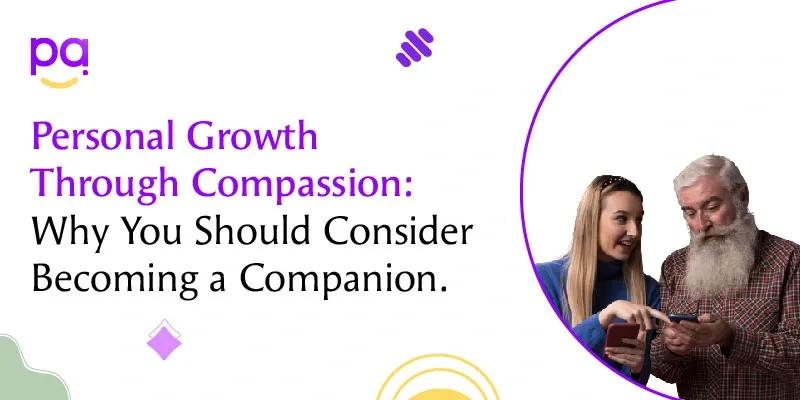Personal Growth Through Compassion: Why You Should Consider Becoming a Companion
In This Article
Personal Growth Through Compassion: Why You Should Consider Becoming a Companion
Sanjana Y S
Updated on December 24, 2024
Medically verified by
Fact checked by

For You
7 min read
Have you ever considered how much personal growth could come from simply being there for someone in need—offering your time, compassion, and presence to brighten their life, and in turn, transforming your own? In today’s fast-paced world, it is easy to get lost in the whirlwind of our own lives. We often focus on personal goals, career growth, or societal expectations, leaving little time to reflect on deeper, more fulfilling connections. Yet, beneath this surface-level drive lies an essential truth: human beings are wired for connection, empathy, and compassion. The simple act of being there for someone can transform both the giver and the receiver. This is where the role of a companion comes into play, offering a pathway for personal growth that is as profound as it is rewarding. Becoming a companion is more than just a job—it is an opportunity to tap into the human capacity for kindness and understanding, all while fostering your own emotional, social, and psychological growth. As the Pa Companionship Service prepares to launch in Bengaluru, the role of a companion becomes even more crucial. The mission of providing companionship to elderly and dependents offers a glimpse into a profession where growth, both personal and communal, is not only possible but guaranteed.
1. The Power of Compassion
At the core of being a companion lies the power of compassion. Compassion is not just sympathy; it is the ability to understand someone else’s pain and do what you can to alleviate it. When you become a companion, you are stepping into someone’s life at a time when they may be vulnerable, lonely, or in need of support. Whether it’s providing companionship during medical treatments, assisting with daily tasks, or simply being a listening ear, your role has a profound impact on another’s life. But here’s the beauty: compassion is a two-way street. While you offer care and support, you’ll often find that the very act of being present for someone else allows you to grow emotionally. Studies have shown that compassionate behavior can lead to lower levels of stress, greater emotional resilience, and even improved physical health. In a world where mental and emotional well-being is becoming increasingly challenging, companionship offers a healthy and fulfilling way to reconnect with the best parts of yourself.
2. Building Meaningful Connections
In an age dominated by technology, genuine human connection is becoming a rare commodity. Many of us spend hours communicating through screens, often without truly engaging in meaningful interactions. As a companion, however, you are granted the gift of forming deep, authentic relationships with the people you serve. Whether it’s through shared stories, mutual interests, or just the simple act of being there, the connections you build will be genuine and lasting. These relationships not only provide emotional satisfaction but also teach you important life lessons. Companions often work with elders, who carry a wealth of wisdom and experience. By spending time with them, you’ll have the unique opportunity to learn from their stories, mistakes, and victories. In turn, this broadens your perspective, offering insights that can positively influence your own life path.
3. Personal Growth Through Giving
At first glance, companionship may seem like an act of giving—your time, your energy, your care—but, in reality, it is equally an act of receiving. Personal growth is deeply tied to altruism, and numerous studies back this up. When we engage in acts of kindness and compassion, we activate areas of the brain associated with happiness and fulfillment. As a companion, you will regularly experience the joy that comes from making a positive impact on another’s life. Furthermore, becoming a companion teaches patience, empathy, and emotional intelligence—skills that are transferable to every aspect of your life. Whether it’s learning how to manage stress, practicing active listening, or simply being present in the moment, these skills will serve you well, both professionally and personally. Every encounter with an elder or dependent is an opportunity to reflect, grow, and develop a deeper understanding of what it means to be human.
 5 min read
5 min readCompanionship for Those Who Are Blind
 5 min read
5 min readCompanionship for Those with Mobility Issues
 5 min read
5 min readHow Pa Companionship will help the NRI community
Get a Callback Now
4. Breaking Down Barriers
One of the most rewarding aspects of being a companion is the ability to break down social barriers. Elders and dependents often face isolation, not just because of physical limitations but due to societal perceptions that they are no longer “valuable” contributors. As a companion, you challenge this notion head-on. By offering your time, respect, and companionship, you show that every individual, regardless of age or ability, deserves dignity and connection. In doing so, you also dismantle internal barriers. Many of us hold preconceived notions about aging, illness, or disability—barriers that limit our ability to engage fully with others. When you work as a companion, you quickly learn that these experiences are universal. Everyone, at some point in their lives, will face challenges. Recognizing this creates a sense of shared humanity, which can significantly impact how you relate to the world around you.
5. Career Benefits and Life Skills
While companionship is deeply fulfilling on a personal level, it also offers tangible benefits for your career and skill set. The experiences you gain as a companion are highly valuable in various professional fields, including healthcare, counseling, social work, and customer service. Skills like emotional intelligence, active listening, conflict resolution, and time management are crucial for success in any career, and companionship helps hone them. Moreover, working as a companion can serve as a stepping stone to future opportunities. For those interested in pursuing careers in healthcare or elder care, it provides real-world experience that is both practical and insightful. You’ll learn the intricacies of care work, from understanding specific medical needs to navigating emotional challenges—all of which will enhance your professional credentials.
6. Flexibility and Work-Life Balance
One of the significant advantages of becoming a companion with a service like Pa Companionship is the flexibility it offers. Traditional caregiving roles can sometimes come with rigid schedules, but Pa’s model allows companions to choose the hours and tasks that best suit their lifestyle. Whether you are a student, a part-time worker, or a retiree looking for meaningful engagement, companionship provides a flexible, fulfilling option. This balance between personal time and professional engagement is crucial for maintaining overall well-being. It allows you to contribute meaningfully to society without sacrificing your personal life or other commitments. Plus, the on-demand nature of Pa Companionship ensures that you can take on roles that align with your availability and preferences.
7. A Sense of Purpose
Perhaps the most significant benefit of becoming a companion is the sense of purpose it provides. Many people struggle with feelings of aimlessness, particularly in jobs that don’t align with their values or passions. Companionship, by its very nature, is purposeful. Every interaction, no matter how small, contributes to another person’s well-being. This sense of purpose can have profound effects on your overall life satisfaction. When you know that your work is meaningful, it becomes more than just a way to make money—it becomes a source of joy, pride, and fulfillment. Companionship allows you to wake up each day knowing that you are making a real difference in someone’s life, and there is no greater reward than that.
8. The Ripple Effect of Compassion
Lastly, it’s important to recognize that the impact of companionship goes beyond the individual. By fostering compassion and connection in your role, you are contributing to a larger societal movement. As more people embrace the values of empathy, respect, and care, we can create a world where no one feels isolated or forgotten. Your role as a companion is a crucial part of this ripple effect, inspiring others to step forward and offer their kindness as well.
Companionship nurtures emotional, social, and psychological growth for both the giver and receiver.
It fosters lasting relationships, offering life lessons and a wider perspective, especially with elders and dependents.
Companion roles, like those with Pa, offer career flexibility, life skills, and a deep sense of purpose.
Source Links
Positivepsychology.com

